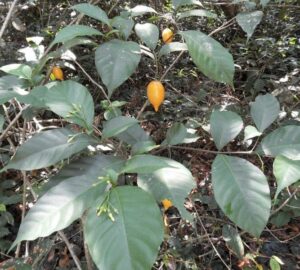Everyone is watching MAPS and Lykos Therapeutics to see whether the FDA will approve MDMA-assisted therapy for PTSD, and if Lykos will secure a patent for MDMA. But while all the attention has been on them, other biotech firms are doing something similar. Enveric Biosciences is currently waiting on the FDA to approve its psychedelic compound, EB-002, which it also filed — and received — patents for, according to Green Market Report.
EB-002 is described as a “next-generation” psilocin pro-drug and is currently a candidate to become a medication for anxiety disorders. Psilocin is one of the major compounds in psilocybin mushrooms. In fact, psilocybin converts to psilocin in the digestive tract and is technically the molecule that produces the psychedelic experience.
“EB-002 now enjoys US patent coverage under three issued patents,” CEO Joseph Tucker said in a statement. The patents cover the drug’s composition, manufacturing methods, and treatment applications.”
READ: Psychedelic Pharma Has Arrived—But Will It Really Be Different from Big Pharma?
The patents essentially expand the number of approved conditions EB-002 can be used, including sleep disorders, depression, substance-use issues, and headaches. According to a company spokesperson, the common thread between these mental health conditions is the activation of similar neurotransmitter systems.
“EB-002 now has additional patent protection supporting the enhanced potential to both expand into additional neurological conditions and serve a broad range of patient populations,” the statement said.
Green Market Report notes that while EB-002 is still in development, Enveric is also working to build awareness for its other compound, EB-003, which it hopes to obtain patents for and FDA approval. The biotech firm announced last month that it is prioritizing EB-003 — what it refers to as a “neuroplastogen” — a compound the company has designed to treat mental health conditions without inducing the psychedelic experience. Enveric aims to have a pre-investigational “New Drug” meeting with the FDA for EB-003 in early 2025.
How to Grow Shrooms Bundle
Take Both of Our Courses and Save $90!
Learn More
Enveric Biosciences says “neuroplastogen” treatments are designed to enhance the brain’s capacity to create new neural connections. The removal of the trip is to make them available to a wider population of patients who don’t want to experience hallucinogenic effects.
“EB-003 has the potential to be a breakthrough neuroplastogen drug candidate that offers the ability to treat resistant mental health disorders without the hallucinogenic effect typically associated with psychedelic-based molecules,” Joseph Parker said in a statement.
Patenting and removing the trips from psychedelic compounds are central to two respective (yet related) debates within the psychedelic space. Both of them highlight the motive of biotech firms and Big Pharma cashing in on a “psychedelic gold rush” and staking a claim on compounds (or derivatives of said compounds) that have long belonged to the clandestine heroes and renegades of the underground, not to mention Indigenous cultures. Patents and the creation of trip-free psychedelics bring up massive ethical concerns, accessibility and cost, appropriation, stifling innovation and therapeutic efficacy, and exclusivity.
Remember, Enveric Biosciences isn’t the only company traversing the patented, trip-free psychedelic pathway. Neither is Lykos Therapeutics. Compass Pathways, Usona, ATAI Life Sciences, and Mind Medicine Inc (MindMed) are other biotech firms working to secure patents on psychedelic drugs (that produce trips and don’t) with the goal of obtaining FDA approval.
READ: How to Become a Psychedelic Integration Therapist
In fact, in 2019, MindMed acquired the (previously patented) rights to a compound known as 18-MC, an analog of ibogaine. Ibogaine is essentially an isolated, lab-made compound originally derived from Iboga, a West African shrub known for inducing “waking dream states” that can last longer than LSD. It is also traditionally used by the Bwiti people of West Africa as an initiation rite. Broadly speaking, ibogaine is of interest to Western medicine because it can disrupt opioid and other drug cravings, giving people an opportunity to overcome addiction. But, 18-MC lacks ibogaine and iboga’s signature visual and auditory distortions, which are believed to be the root of the substance’s therapeutic effects.
Enter the trip-free psychedelics debate. It’s likely we are going to see an even larger wave of trip-free drugs securing patents and vying for FDA approval. I know many people feel complicated emotions towards MAPS and Lykos Therapeutics, but at least they’re leaving the effects of our beloved MDMA intact.
DoubleBlind is a trusted resource for news, evidence-based education, and reporting on psychedelics. We work with leading medical professionals, scientific researchers, journalists, mycologists, indigenous stewards, and cultural pioneers. Read about our editorial policy and fact-checking process here.
DoubleBlind Magazine does not encourage or condone any illegal activities, including but not limited to the use of illegal substances. We do not provide mental health, clinical, or medical services. We are not a substitute for medical, psychological, or psychiatric diagnosis, treatment, or advice. If you are in a crisis or if you or any other person may be in danger or experiencing a mental health emergency, immediately call 911 or your local emergency resources. If you are considering suicide, please call 988 to connect with the National Suicide Prevention Lifeline.
DoubleBlind Mag Read More



